

New OECD proposal aims to shore up tax revenues in digital era – Government & civil service news. The proposal is based on the work of the OECD/G20 Inclusive Framework on BEPS, under which 134 countries are collaborating to put an end to tax avoidance strategies.
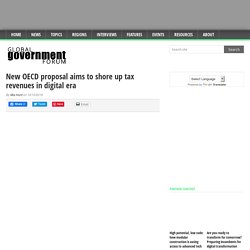
(Image courtesy: The White House/flickr). The OECD has published a proposal that aims to advance international negotiations to ensure large and highly profitable multinational enterprises (MNEs), including digital companies, pay tax wherever they have significant consumer-facing activities and generate profits. The new proposal brings together common elements of three competing proposals from member countries, and seeks to reallocate some profits and corresponding taxing rights to countries and jurisdictions where MNEs have their markets. Commission foresight group spots 100 radical innovation breakthroughs with strong impact on global economy. A foresight report published by the European Commission identifies 100 radical innovation breakthroughs that are likely to have a strong impact on the global economy and advises the EU to boost investment in artificial intelligence and related technologies.
We’ve had private currencies like Libra before. It was chaos. Government-backed currencies rule the world.
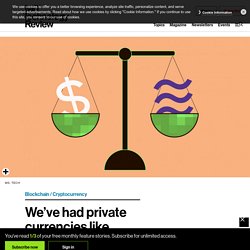
But they could soon face legitimate challengers in the form of private digital currencies, particularly if Facebook or some other big company launches one. How will that affect the financial system? If history is any guide, then “people aren’t going to like it,” argues James Bullard, president and CEO of the US Federal Reserve Bank of St. Louis. Bullard, one of 12 regional presidents who run central bank branches across the country, spoke about the topic last week at an academic conference for central bankers in New York. We’ve had private currencies like Libra before. It was chaos. African Lions: Nigeria’s jobless growth. Nigeria, sub-Saharan Africa’s biggest economy and most populous country, has recorded high growth in recent years.
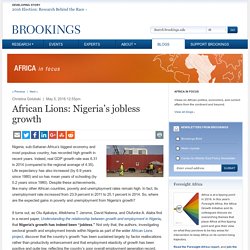
Indeed, real GDP growth rate was 6.31 in 2014 (compared to the regional average of 4.35). Life expectancy has also increased (by 6.9 years since 1980) and so has mean years of schooling (by 0.2 years since 1980). Despite these achievements, like many other African countries, poverty and unemployment rates remain high. In fact, its unemployment rate increased from 23.9 percent in 2011 to 25.1 percent in 2014. The Brightest Millennials in Business: Here's What They Think. Investors, advertisers, and business leaders around the world are still trying to understand millennials, the generational group that will shape commerce for the foreseeable future.
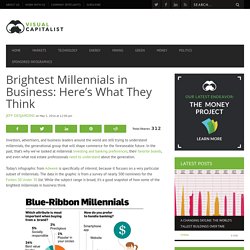
In the past, that’s why we’ve looked at millennial investing and banking preferences, their favorite brands, and even what real estate professionals need to understand about the generation. Today’s infographic from Adweek is specifically of interest, because it focuses on a very particular subset of millennials. The data in the graphic is from a survey of nearly 500 nominees for the Forbes 30 Under 30 list. World's Longest Negative Rate Experiment Shows Perversions Ahead. When interest rates are high, people borrow less and save more.
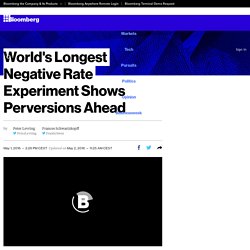
When they’re low, savings go down and borrowing goes up. But what happens when rates stay negative? QuickTake Negative Interest Rates In Denmark, where rates have been below zero longer than anywhere else on the planet, the private sector is saving more than it did when rates were positive (before 2012). Private investment is down and the economy is in a “low-growth crisis,” to quote Handelsbanken. Work in the Future Will Fall into These 4 Categories. From The New York Public Library Organizations are more boundary-less, agile, global, and transparent — and will be even more so in the future.

Work and workers (yes, humans) will always be essential to organizations, but organizations themselves will be more diverse, and work will be organized, structured, and done in new ways, increasingly through arrangements outside of regular full-time employment. How can leaders navigate this new digital work ecosystem? How should your organization plan for the changes ahead? China’s Two-Speed Economy. China’s Two-Speed Economy. Why the G20 needs to focus on the digital economy. The world was a very different place in December 1999 when the first G20 met in Berlin.
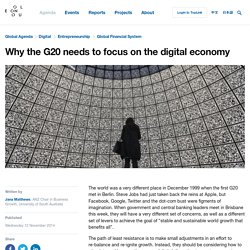
Steve Jobs had just taken back the reins at Apple, but Facebook, Google, Twitter and the dot-com bust were figments of imagination. When government and central banking leaders meet in Brisbane this week, they will have a very different set of concerns, as well as a different set of levers to achieve the goal of “stable and sustainable world growth that benefits all”. The path of least resistance is to make small adjustments in an effort to re-balance and re-ignite growth. Sharing economy: It's really an old-style rental economy - CBC News - Latest Canada, World, Entertainment and Business News. At the headquarters of Airbnb in downtown San Francisco, employee meeting rooms have been designed as exact replicas of actual apartments that are available for rent from Airbnb hosts in cities around the world.

"The point is to always remind us what business we're in," Douglas Atkin, the company’s global head of community, observed on a recent tour. We were standing in a kitchen modelled after a Paris apartment. Creative Economy Employment in the US, Canada and the UK. This report measures employment in the creative economies of the US, Canada and the UK.
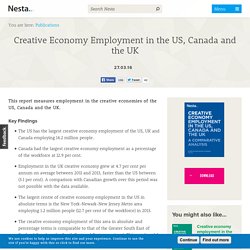
Key Findings The US has the largest creative economy employment of the US, UK and Canada employing 14.2 million people.Canada had the largest creative economy employment as a percentage of the workforce at 12.9 per cent.Employment in the UK creative economy grew at 4.7 per cent per annum on average between 2011 and 2013, faster than the US between (3.1 per cent).